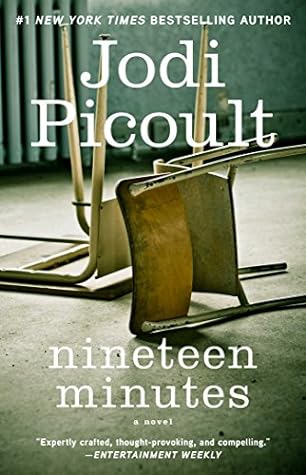More on this book
Community
Kindle Notes & Highlights
There were two ways to be happy: improve your reality, or lower your expectations.
“Isn’t it amazing how, when you strip away everything, people are so much alike?”
Nobody wants to admit to this, but bad things will keep on happening. Maybe that’s because it’s all a chain, and a long time ago someone did the first bad thing, and that led someone else to do another bad thing, and so on. You know, like that game where you whisper a sentence into someone’s ear, and that person whispers it to someone else, and it all comes out wrong in the end. But then again, maybe bad things happen because it’s the only way we can keep remembering what good is supposed to look like.
“The best thing is what you think should be done. The rightest thing is what needs to be done—when you think not just of you and how you feel, but also the extra stuff—who else is involved, and what’s happened before, and what the rules say.”
If you spent your life concentrating on what everyone else thought of you, would you forget who you really were? What if the face you showed the world turned out to be a mask . . . with nothing beneath it?
You couldn’t argue the facts; you could only change the lens through which you looked at them.
If you gave someone your heart and they died, did they take it with them? Did you spend the rest of forever with a hole inside you that couldn’t be filled?
People had figured out all sorts of ways to make things seem different than they truly were.
He knew that there was a difference between something that makes you happy and something that doesn’t make you unhappy. The trick was convincing yourself these were one and the same.
Someone who was happy would have little need to hope for change. But, conversely, an optimistic person was that way because he wanted to believe in something better than his reality.
Actually, she liked math. She loved knowing that if she worked hard enough, at the end there was going to be an answer that made sense.
And that was the greatest heartbreak of all—no matter how spectacular we want our children to be, no matter how perfect we pretend they are, they are bound to disappoint. As it turns out, kids are more like us than we think: damaged, through and through.
Happiness wasn’t just what you reported; it was also how you chose to remember.
You could share DNA with someone and still have nothing in common with them.
Life was what happened when all the what-if’s didn’t, when what you dreamed or hoped or—in this case—feared might come to pass passed by instead.
What she hadn’t realized was that sometimes when your vision was that sharp and true, it could cut you. That only if you’d felt such fullness could you really understand the ache of being empty.
Children didn’t make their own mistakes. They plunged into the pits they’d been led to by their parents.
Acceptance started at home, but so did intolerance.
Taking credit for what a child did well also meant accepting responsibility for what they did wrong.
“When someone dies, their lives aren’t the ones that stop at that moment, you know?”
You can tell a lot about people by their habits.
Maybe it was our own damn fault that men turned out the way they did, Selena thought. Maybe empathy, like any unused muscle, simply atrophied.
“You don’t need water to feel like you’re drowning, do you?”
Jail wasn’t all that different from public school, really. The correctional officers were just like the teachers—their job was to keep everyone in place, to feed them, and to make sure nobody got seriously hurt. Beyond that, you were left to your own devices. And like school, jail was an artificial society, with its own hierarchy and rules. If you did any work, it was pointless—cleaning the toilets every morning or pushing a library cart around minimum security wasn’t really that different from writing an essay on the definition of civitas or memorizing prime numbers—you weren’t going to be
...more
There’s a word we learned in social studies: schadenfreude. It’s when you enjoy watching someone else suffer. The real question, though, is why? I think part of it is just self-preservation. And part of it is because a group always feels more like a group when it’s banded together against an enemy. It doesn’t matter if that enemy has never done anything to hurt you—you just have to pretend you hate someone even more than you hate yourself.
“When you look into your baby’s eyes,” Lacy said softly, “you see everything you hope they can be . . . not everything you wish they won’t become.”
“Everyone thinks you make mistakes when you’re young,” the judge said to Lacy. “But I don’t think we make any fewer when we’re grown up.”
I think a person’s life is supposed to be like a DVD. You can see the version everyone else sees, or you can choose the director’s cut—the way he wanted you to see it, before everything else got in the way. There are menus, probably, so that you can start at the good spots and not have to relive the bad ones. You can measure your life by the number of scenes you’ve survived, or the minutes you’ve been stuck there. Probably, though, life is more like one of those dumb video surveillance tapes. Grainy, no matter how hard you stare at it. And looped: the same thing, over and over.
What’s the difference between spending your life trying to be invisible, or pretending to be the person you think everyone wants you to be? Either way, you’re faking.”


